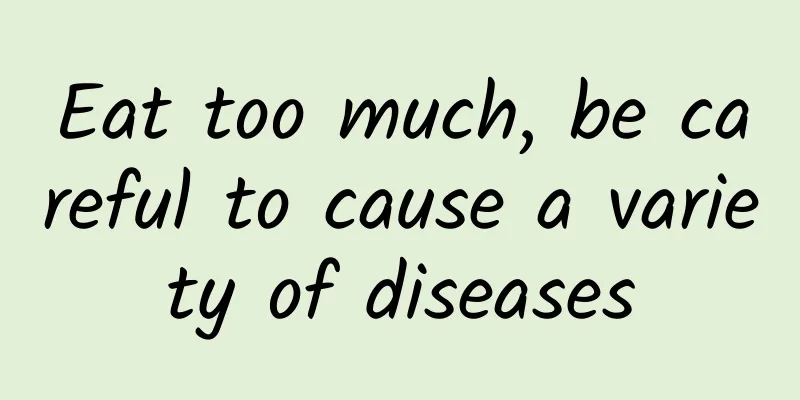Eat too much, be careful to cause a variety of diseases

|
Eating less can lead to longer life and better health. This is the conclusion scientists have reached after decades of research. Let’s take a look at the serious consequences of eating too much! Overeating can easily lead to obesity: Modern people often eat high-fat and high-protein foods, which are more difficult to digest. Excess "nutrients" accumulate in the body, resulting in obesity and a series of diseases of affluence. Numerous scientific studies have confirmed that obesity can lead to cardiovascular disease, hypertension, diabetes, fatty liver, arteriosclerosis, cholecystitis and other diseases, plus the complications caused by them, which may reach hundreds. Eating too much can easily cause cancer: When the human body consumes too much protein or fat, it will put a burden on the digestive system, and food that cannot be digested well will remain in the intestines for a long time, which can easily produce some toxins or even carcinogens. In addition, eating too much will reduce the activity of factors that inhibit cell carcinogenesis and increase the probability of cancer. Overeating can easily lead to Alzheimer's disease: Overeating will cause a large amount of biological factors called "fibroblasts" to be produced in the brain, which will enlarge fat cells and capillary endothelial cells, promote cerebral arteriosclerosis, insufficient blood supply to the cerebral cortex, slow brain atrophy and brain function degeneration, and eventually lead to dementia, thus shortening a person's life span. Japanese experts have also found that about 30%-40% of Alzheimer's patients have the habit of long-term overeating in their youth. Eating too much can easily lead to premature aging: the food eaten is digested, metabolized and oxidized in the body to produce energy, but the body's oxidation reaction also produces harmful compounds called free radicals, which can cause cell damage and arteriosclerosis, leading to disease, aging, and even death. The more energy the human body consumes, the more free radicals are produced, and the faster the human body ages. On the contrary, eating less can reduce the production of free radicals, thereby delaying aging. Eating too much can easily damage the stomach and intestines: if the stomach is always in a bloated state, the gastric mucosa will not have a chance to repair. The stomach secretes a large amount of gastric juice, which will damage the gastric mucosa, causing gastric inflammation and indigestion symptoms. In the long run, diseases such as gastric ulcers and gastric ulcers may also occur. In addition, fat blocking in the intestines can cause intestinal obstruction, causing abdominal pain, vomiting, black stools, etc. Eating too much can easily damage your kidneys and bones: Overeating can damage the human urinary system, because too much non-protein ammonia needs to be excreted from the kidneys, which will inevitably increase the burden on the kidneys; overeating can also easily cause excessive decalcification of the bones, greatly increasing the probability of developing osteoporosis. |
<<: Do some "healthy things" before going to bed
>>: 25 years of research in the United States reveals: How to eat carbohydrates to be healthy?
Recommend
Evidence of loneliness, it is difficult to save autistic children
Many parents of children with autism have spent a...
What to eat to maintain the uterus after abortion
We all know that having a healthy body is closely...
Is 25mm of pelvic fluid serious?
If the pelvic effusion reaches 25mm, it means tha...
What is an adnexal cyst?
Speaking of adnexal cysts, I believe it is not un...
The benefits of Panax notoginseng on uterine fibroids
Uterine fibroids are a common reproductive organ ...
Can I have sex during the implantation period?
During the pregnancy preparation period, young co...
I feel sore all over but my period is not coming
Important reminder: Many female friends experienc...
Does drinking alcohol help sexual performance? Is medicinal liquor good for the body? The truth is...
Author: Wang Bingyuan, Chief Physician, First Aff...
There may be signs of Alzheimer's disease ten years in advance! These factors must be controlled...
Reviewer of this article: Chen Haixu, Deputy Dire...
What to do about antibody infertility
In fact, many women will have immune infertility,...
Can Alipay be used in Dubai Airport Duty Free Shop? What currencies can be used in Dubai Airport Duty Free Shop?
Dubai is a world-famous city and the most populou...
Symptoms of polycystic uterus
Polycystic uterus is a common disease in women. I...
Can mother and baby breastfeed if they both have a cold?
The quality of breast milk is directly linked to ...
What should I do if I have bleeding during intercourse before my period is over?
Every woman has a few days every month when the m...
Will cesarean section cause heavy bleeding?
Nowadays, more and more female friends choose cae...









